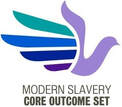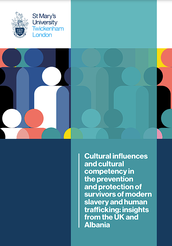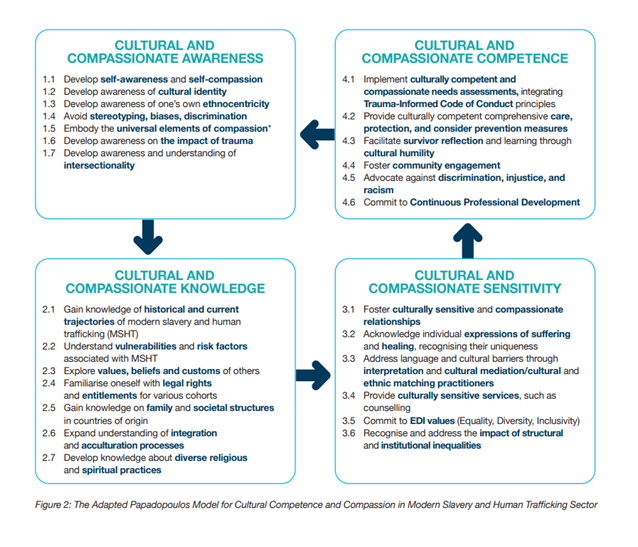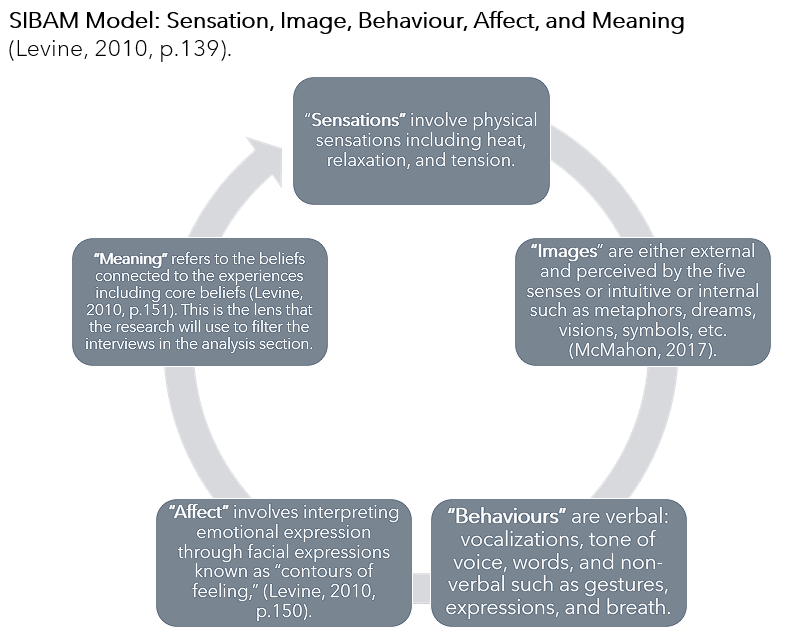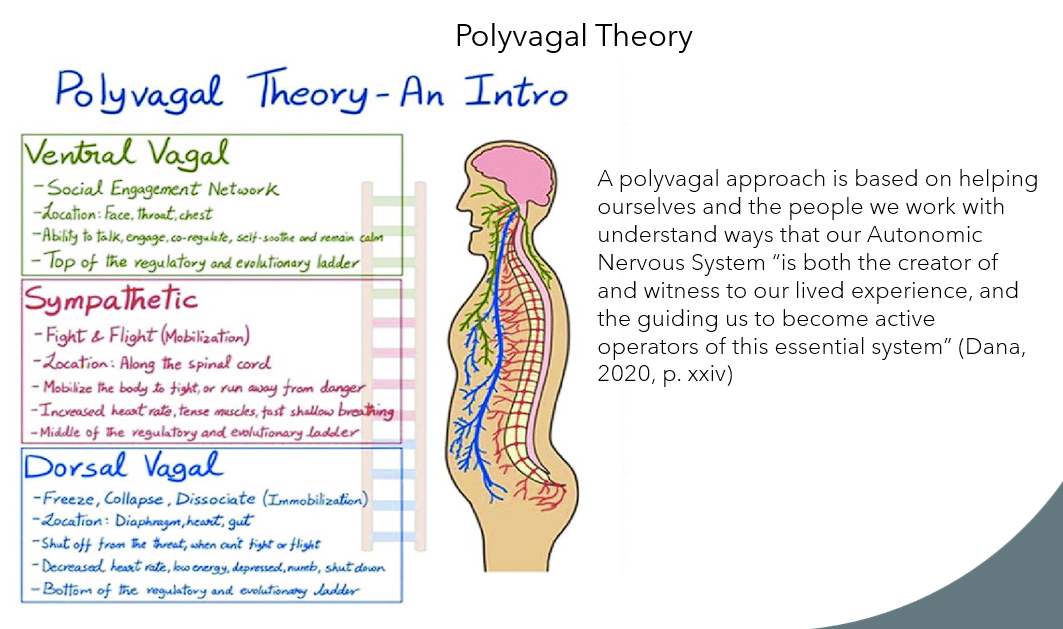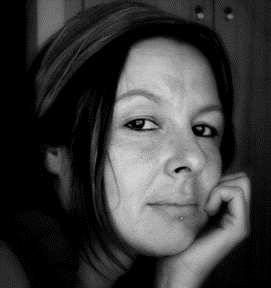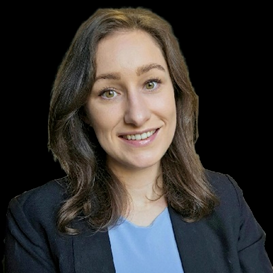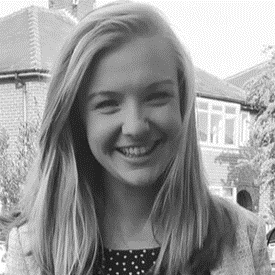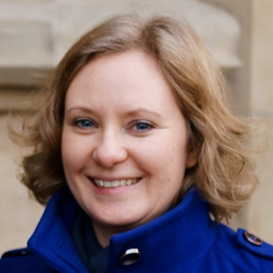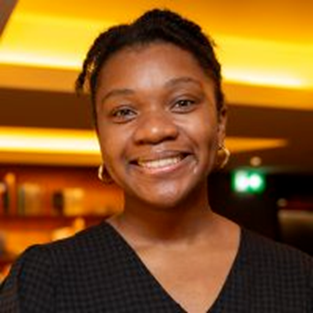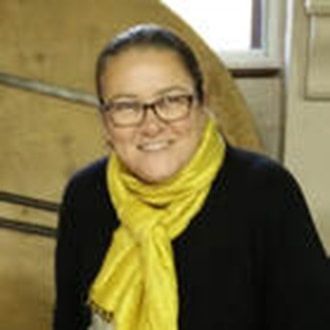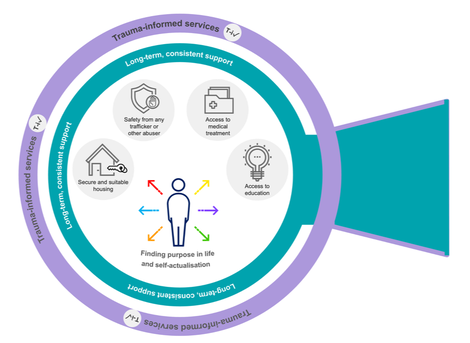Hello,
Welcome to Update 25 for the MSCOS Community of Practice (MS-CoP). In this edition:
Scroll down to watch individual recordings of our expert speakers at the MS-CoP forum: Securing Long-Term Suitable Housing for Survivors of Modern Slavery
We are also featuring academic research projects which directly relate to the development of best practice in the anti-trafficking sector. We would like to thank: Anta Brachou, Postdoctoral Researcher and Co-investigator at Bakhita Centre for Research on Slavery, Exploitation and Abuse, St Mary's University, who explains the new adaptation of the Cultural Competency and Compassionate Care Framework specifically for the modern slavery sector; Asst Professor Finia Kulhman, Society & Organisations Institute at HEC Paris who shares her conceptual exploration of survivor leadership conducted in partnership with MS-CoP; and Eva Karra, Anti-trafficking and Community Development Consultant, who details her MA research at Bakhita Centre, St Mary's University, investigating the 'embodiment' of vicarious trauma and its effects via the lived experienced of professionals who have been working with survivors over years.
Further information from Patricia Hynes on the Creating Stable Futures for Positive Outcomes Framework project is below. You can also view the MS-CoP Creating Stable Futures Speakers forum.
If you would like to share academic research, projects, programmes, services, reports or any other information that directly relates to practice in the modern slavery/human trafficking sector, please contact us. Our MS-CoP subscribers span all related practice fields and would love to know about it!
Welcome to Update 25 for the MSCOS Community of Practice (MS-CoP). In this edition:
Scroll down to watch individual recordings of our expert speakers at the MS-CoP forum: Securing Long-Term Suitable Housing for Survivors of Modern Slavery
We are also featuring academic research projects which directly relate to the development of best practice in the anti-trafficking sector. We would like to thank: Anta Brachou, Postdoctoral Researcher and Co-investigator at Bakhita Centre for Research on Slavery, Exploitation and Abuse, St Mary's University, who explains the new adaptation of the Cultural Competency and Compassionate Care Framework specifically for the modern slavery sector; Asst Professor Finia Kulhman, Society & Organisations Institute at HEC Paris who shares her conceptual exploration of survivor leadership conducted in partnership with MS-CoP; and Eva Karra, Anti-trafficking and Community Development Consultant, who details her MA research at Bakhita Centre, St Mary's University, investigating the 'embodiment' of vicarious trauma and its effects via the lived experienced of professionals who have been working with survivors over years.
Further information from Patricia Hynes on the Creating Stable Futures for Positive Outcomes Framework project is below. You can also view the MS-CoP Creating Stable Futures Speakers forum.
If you would like to share academic research, projects, programmes, services, reports or any other information that directly relates to practice in the modern slavery/human trafficking sector, please contact us. Our MS-CoP subscribers span all related practice fields and would love to know about it!
Research and Practice
|
Anta Brachou,
Postdoctoral researcher, St Mary's University |
Cultural Influences and Cultural Competency in the Prevention and Protection of Survivors of Modern Slavery and Human Trafficking:
Insights from the UK and Albania
Anta Brachou, Co-Investigator for the project explains:
“The Cultural Competency and Compassionate Care Framework prioritises the dignity and well-being of survivors, encouraging all those involved in the sector to embrace cultural humility and embark on self-explorative journeys. Professionals who are equipped to understand and acknowledge the significance of cultural nuances in relation to survivors’ experiences, are better positioned to tailor policies, interventions and services to meet their diverse needs. Cultural nuances play a significant role in shaping survivors’ experiences. These are the differences or aspects within a culture that may not be immediately obvious to others, but are important for understanding the culture more deeply. Cultural nuances extend beyond borders and social inequalities, including for example, traditions, communications, manners, values, and belief systems unique to specific cultural groups, as well as distinctions and behaviours rooted in social class. In emphasising universal principles of cultural awareness, cultural sensitivity and compassion, the framework transcends national and ethnic boundaries, making it suitable for use with various cultural groups, including those defined by factors beyond nationality and ethnicity. It provides a dynamic ‘living tool’ for considering and adapting to broader inequalities, ensuring effectiveness and relevance for various communities and contexts as well as professional settings.” |
Anta Brachou invites practitioners to exercise 'cultural humility'
|
Finia Kuhlmann,
Assistant Professor, HEC Paris |
Examining Survivor Perspectives on Leadership: A Conceptual Analysis
This current research project exploring the concepts and assumptions related to survivor leadership, is funded by the Society & Organisations (S&O) Institute at HEC Paris. It is led by principle investigator, Asst. Professor Finia Kuhlmann and is conducted in partnership with the MS-CoP.
“In business contexts and environments across the world, new conceptualizations of leadership are emerging, such as ‘purposeful leadership’ and ‘compassionate leadership’. At the same time, in the modern slavery/human trafficking sector, survivor leadership and the value of ‘lived experience’ is increasingly promoted and included in organizational programs, policy development and academic research. Survivor leadership is commonly presented as best practice and linked back to the long-standing principle ‘nothing about us without us.’ Nonetheless, it is a concept that has emerged fairly rapidly and there is ambiguity around its precise meaning and practices. Survivor leaders, and other professionals have voiced concerns and identified a need to address issues including professional terminology, ethical employment and payment, delineation of professional roles and remits and appropriate terms and conditions. How is the concept of survivor leadership in itself, experienced and understood by people who are currently engaged in professional work as ‘survivor leaders’ or ‘experts with lived experience’? Working in partnership with the MS-CoP team, including the Research Advisory Board and external survivor leaders from a range of backgrounds and professional roles, we have begun to explore individual reflections, experiences and insights to learn more about both the concepts and the assumptions relating to survivor leadership. Themes arising from discussions and interviews include vulnerability, empathy, power, voice, representation, and recognition. I am specifically interested in thinking about how different concepts intersect, shape and are shaped by vulnerability and I believe that the learnings from this project will provide valuable insights to wider concepts of leadership across diverse contexts.” |
Experience of conducting research with the MS-CoP team:
MS-CoP provides a access to a diverse range of practice-focused external partners and experts. As a researcher, it has been wonderful to engage with the MSCOS Research Advisory Board’s vibrant and thoughtful team of survivor leaders. The logistical and trauma-informed support provided by the MS-CoP team is integral to this project, together with invaluable guidance on co-design and ethical approaches to research.
For information on conducting research in collaboration with the MS-CoP team, please contact us at [email protected]
MS-CoP provides a access to a diverse range of practice-focused external partners and experts. As a researcher, it has been wonderful to engage with the MSCOS Research Advisory Board’s vibrant and thoughtful team of survivor leaders. The logistical and trauma-informed support provided by the MS-CoP team is integral to this project, together with invaluable guidance on co-design and ethical approaches to research.
For information on conducting research in collaboration with the MS-CoP team, please contact us at [email protected]
|
Eva Karra,
Anti-Trafficking & Community Development Consultant |
Exploring The Lived Experience Of Vicarious Trauma Of Professionals That Work With Survivors Of Human Trafficking And Modern Slavery: An Interpretative Phenomenological Analysis Using The Embodiment Framework. Allowing The Body To Tell The Trauma Story
As the modern slavery/human trafficking sector increasingly focuses on the value of the lived experience of survivors of trafficking, Eva Karra’s research into vicarious trauma investigates the lived experience of the professionals who work with them.
“The trauma experienced by victims of trafficking is distinct in its intricacy, complexity and profound impact upon their lives. As a practitioner having worked with vulnerable populations, including survivors of human trafficking, torture, gender-based violence, and unaccompanied minors, I have always been interested in the impact that trauma leaves on the professionals who are exposed to it secondarily. This includes, for example, support workers and practitioners, researchers, law enforcement personnel, first responders, health professionals and a wide range of volunteers. In the course of my research, I reviewed and considered clinical, psycho-social and phenomenological interpretations of vicarious trauma. I conducted interviews with five long-standing professionals who have all worked closely with victims of trafficking over years in specialist NGO/support and health services, senior law enforcement, academic research and training on modern slavery, research and writing on trauma of survivors, and design and delivery of movement/pilates classes specifically for survivors with trauma. I wanted to give space to professionals and practitioners who have different roles and therefore different tasks with survivors, to express their experience of secondary/ vicarious trauma and the impact of their committed engagement with survivors. |
The lived experience of these professionals was the focus of the interviews as well as the way each gave meaning to these experiences. In interview they expressed not only their thought processes, but also the way their body carries and expresses that impact. Using the S.I.B.A.M model I was able to group and analyse sensations, imagery, visuals, observed behaviours, tone of voice, affect, and meaning-making processes.
My research findings revealed that phenomenology and the framework of embodiment are well suited to explore the professionals’ embodied, lived experience of vicarious trauma, allowing the body to speak as the “teller of tales, the expresser of need and the site of trauma’s integration with the self (Rothschild, Levine and van der Kolk)
Applying this knowledge to practice:
Vicarious trauma doesn’t only affect the mind and thoughts of professionals, it has an imprint on the entire autonomic nervous system. This is what is meant when we refer to the ‘embodiment of trauma’. When trauma is held in our autonomic nervous system, it cannot be ‘convinced’ through a cognitive process of talking, that ‘I am safe and I feel safe.’ While various approaches to prevention and minimising of vicarious traumatisation are vital and useful, (including clinical supervision and various body-focused exercises) these approaches all need to come together to consciously address the needs of body and mind in unison. They can be meaningful and more effective when they are applied in the broader context of an organizational culture of psychological safety, acceptance and support.
Vicarious trauma doesn’t only affect the mind and thoughts of professionals, it has an imprint on the entire autonomic nervous system. This is what is meant when we refer to the ‘embodiment of trauma’. When trauma is held in our autonomic nervous system, it cannot be ‘convinced’ through a cognitive process of talking, that ‘I am safe and I feel safe.’ While various approaches to prevention and minimising of vicarious traumatisation are vital and useful, (including clinical supervision and various body-focused exercises) these approaches all need to come together to consciously address the needs of body and mind in unison. They can be meaningful and more effective when they are applied in the broader context of an organizational culture of psychological safety, acceptance and support.
Greater awareness of professionals’ ‘embodiment’ of vicarious trauma is needed in all organisations where work is conducted with survivors. It is important to develop systemic responses and learn from the experiences of professionals who have been in this work over decades and have developed an integral understanding of the effect of working with survivors on the mind and body together. The five professionals I interviewed for the study had all developed their own awareness and methods of managing this individually, however, it requires a systemic approach to ensure that professionals can be sustained and appropriately supported in their field of work, and do not leave due to vicarious trauma and professional burn-out. The costs of vicarious trauma are high, impacting on individual health and lives as well as on the functioning of collegiate and personal relationships.”
“We need to pay attention to the impact of the work on the professionals that work with trauma survivors and how the work they are doing is making them feel inside themselves. Not to treat them like this is to treat them as less than human. We cannot have people we treat as less than human as our main caregivers. What kind of care are we expecting?" (McCluskey and Gunn, 2015)
Next Steps:
I will be further developing this work in relation to the organisational development of ‘embodiment-conscious,’ integrated responses to vicarious trauma and the creation of a culture of safety for all persons engaged in working with survivors of trafficking.
I am available to further discuss possible consultations with teams and organisations as well as any interest regarding opportunities for the publication of this piece of work.
I will be further developing this work in relation to the organisational development of ‘embodiment-conscious,’ integrated responses to vicarious trauma and the creation of a culture of safety for all persons engaged in working with survivors of trafficking.
I am available to further discuss possible consultations with teams and organisations as well as any interest regarding opportunities for the publication of this piece of work.
- LinkedIn: EvaKarra
- Email address: [email protected]
- TEDxTalk link: TEDxTalk Eva Karra Human Trafficking: If this is a market who feeds the demand?
- Additional Reading: Embodied Trauma and Healing: Critical Conversations on the Concept of Health
Eva Karra undertook the MA in Human Trafficking, Modern Slavery, Organised Crime and Migration at St Mary’s University. She has a background in international community development in Australia, Tanzania, Germany, Albania, South Africa, and Greece, where she had a frontline role in crisis work with adult and child survivors of trafficking. Eva has experience working in direct support and casework for individuals that have experienced severe and complex trauma. She works as a Consultant with Synthesis in Praxis, as a researcher at the Bakhita Centre and is an Associate with the Counter Trafficking Network.
MS-CoP Speakers Forum:
Securing Long-Term Suitable Housing for Survivors of Modern Slavery
|
Rachel Witkin,
Director of MSCOS Community of Practice |
The Need for Collaborative WorkRachel Witkin is Director of the MS-CoP, working alongside the MSCOS partners and Research Advisory Board. Formerly the Director of Counter-Trafficking and Publications at Helen Bamber Foundation, she is an international anti-trafficking practice consultant and the lead writer/consultant for the ODIHR NRM Handbook and related guidances. Rachel speaks and trains on the Trauma-Informed Code of Conduct and has over 25 years experience working on a frontline basis with survivors of trafficking, state torture and other forms of organised violence.
|
|
|
Júlia Tomas,
Modern Slavery Policy and Research Manager, The Passage |
Challanges to House Survivors, The Passage ExperienceJúlia Tomás is the Modern Slavery Policy and Research Manager at The Passage, working on the intersection between homelessness and modern slavery at national and international levels. Júlia Tomás' working experience has been in two parts, firstly as a practitioner working with refugees in post-conflict settings and latterly as an academic. Her research and scholarly interests span forced migration in all its forms, including asylum, refugees, human trafficking, protection and guardianship of children on the move, trust and mistrust in humanitarian settings and human rights.
|
|
|
Bruno Batista,
Survivor Leader and Artist |
Lived Experience of Post-NRM HomelessnessBruno Batista is a Brazilian artist (designer, sculpture and actor) with lived experience. He delivers art workshops to organisations such as The Passage and Accumulate that help people experiencing homelessness and other vulnerable situations. Bruno recently completed the MATTA course (Make Arts to Teach Arts) with Accumulate at Chelsea College of Arts. He is currently developing his own arts workshop based on creation, free expression and free thinking for people experiencing homelessness.
|
|
|
Charlotte Jamieson,
Modern Slavery Coordinator, Westminster City Council and the Royal Borough of Kensington and Chelsea |
Westminster City Council Partnership with The Passage: The Multi-Agency Case Conference modelCharlotte Jamieson is the Modern Slavery and Exploitation Coordinator for the boroughs of Westminster and Kensington and Chelsea. Charlotte coordinates the local partnership response to modern slavery and supports the delivery of the two councils’ five year modern slavery strategy. Charlotte is a qualified social worker, with experience of responding to trafficking and modern slavery in the statutory and third sector. Charlotte is a qualified trainer with experience of delivering collaborative training across the UK and internationally on the prevention and response to human trafficking.
|
|
The Key Issues: Housing for Survivors of Modern Slavery: Whole Housing ApproachRobyn Phillips is the Director of Operations for the Human Trafficking Foundation and has overall responsibility for the delivery of the Foundation’s work to bring together the NGO anti-slavery sector, parliamentarians and statutory services to facilitate positive policy change to better prevent slavery and support survivors. Robyn has extensive experience coordinating multi-agency partnerships within the anti-trafficking sector and prior to this, Robyn worked for youth homelessness charity LandAid, leading on national development and working with statutory agencies to bring empty properties back into use.
|
|
|
Louise Gleich,
Researcher, Modern Slavery Policy Unit, Justice and Care |
Criminal Exploitation: Modern Slavery by Another Name: CuckooingLouise Gleich is Senior Policy Researcher in the Joint Modern Slavery Policy Unit led by the anti-slavery charity Justice and Care and think tank the Centre for Social Justice.
Louise has worked in anti-slavery policy for a number of charities since 2013 including as a research assistant on human trafficking for Lord McColl of Dulwich supporting him with his private members bills. Louise has undergraduate and master’s degrees in law and over the past 25 years she has worked with a number of charities in the UK and overseas undertaking a variety of roles before specialising in anti-slavery policy work. |
|
|
Dami Omole,
Senior Program Manager, Shiva Foundation |
Understanding the Potential of Licensing Framewoorks and Teams to Tackle Modern SlaveryDami serves as the Senior Program Manager at Shiva Foundation, where she joined in 2022, bringing expertise in equality and education programs from both for-profit and not-for-profit sectors. Her significant contributions include authoring resources like the Self-Assessment Scorecard for Local Authorities and the report "Understanding the Potential of Licensing Frameworks and Teams to Tackle Modern Slavery in the UK," aimed at strengthening modern slavery responses. Beyond her professional role, Dami has supported girls and young women from marginalised communities through peer mentoring and access to qualifications.
|
|
Creating Stable Futures For Young Adults Who Have Experienced Human Trafficking
|
Patricia Hynes,
Professor of Social Justice, Sheffield Hallam University |
"We are now in the process of inviting people to our Regional Learning Events which will be held in Sheffield (25 April), London (22 and 23 May), Derby (12 June), Magherafelt, NI (18 June), Glasgow (25 June) and Cardiff (July, date tbc). We will have a prototype of the Creating Stable Futures practice tool at these events and hope practitioners will find this useful for their frontline work"
|
DID YOU KNOW?
The MS-CoP is a forum for practitioners working in all fields and discipline, to share perspectives and link practice. If you would like to feature your work or have feedback for us, please do get in touch! Our criteria for features is based upon the delivery of the Modern Slavery Core Outcome Set (MSCOS), which comprises the 7 core outcomes that survivors of human trafficking have told us must be in place for their well-being, recovery and integration. Email us: [email protected].
The MSCOS Community of Practice is hosted at Kings College London and is written and directed by Rachel Witkin in collaboration with MSCOS project partners: Survivor Alliance, University of Nottingham Rights Lab, Helen Bamber Foundation and the University of East London. It was devised as an integral component of the MSCOS study at Kings College London by Dr Sian Oram and Dr Sharli Paphitis, with the MSCOS Research Advisory Board - Bee Damara, Brook, Juliet Joseph, Keith Lewis, Mimi Jalmasco, Peter Parker, Ruth Aguele, and Wendy. It has been designed, devised and established by Rachel Witkin with Arnas Tamasauskas.and previously, Queenie Sit.
The MSCOS Community of Practice is hosted at Kings College London and is written and directed by Rachel Witkin in collaboration with MSCOS project partners: Survivor Alliance, University of Nottingham Rights Lab, Helen Bamber Foundation and the University of East London. It was devised as an integral component of the MSCOS study at Kings College London by Dr Sian Oram and Dr Sharli Paphitis, with the MSCOS Research Advisory Board - Bee Damara, Brook, Juliet Joseph, Keith Lewis, Mimi Jalmasco, Peter Parker, Ruth Aguele, and Wendy. It has been designed, devised and established by Rachel Witkin with Arnas Tamasauskas.and previously, Queenie Sit.
